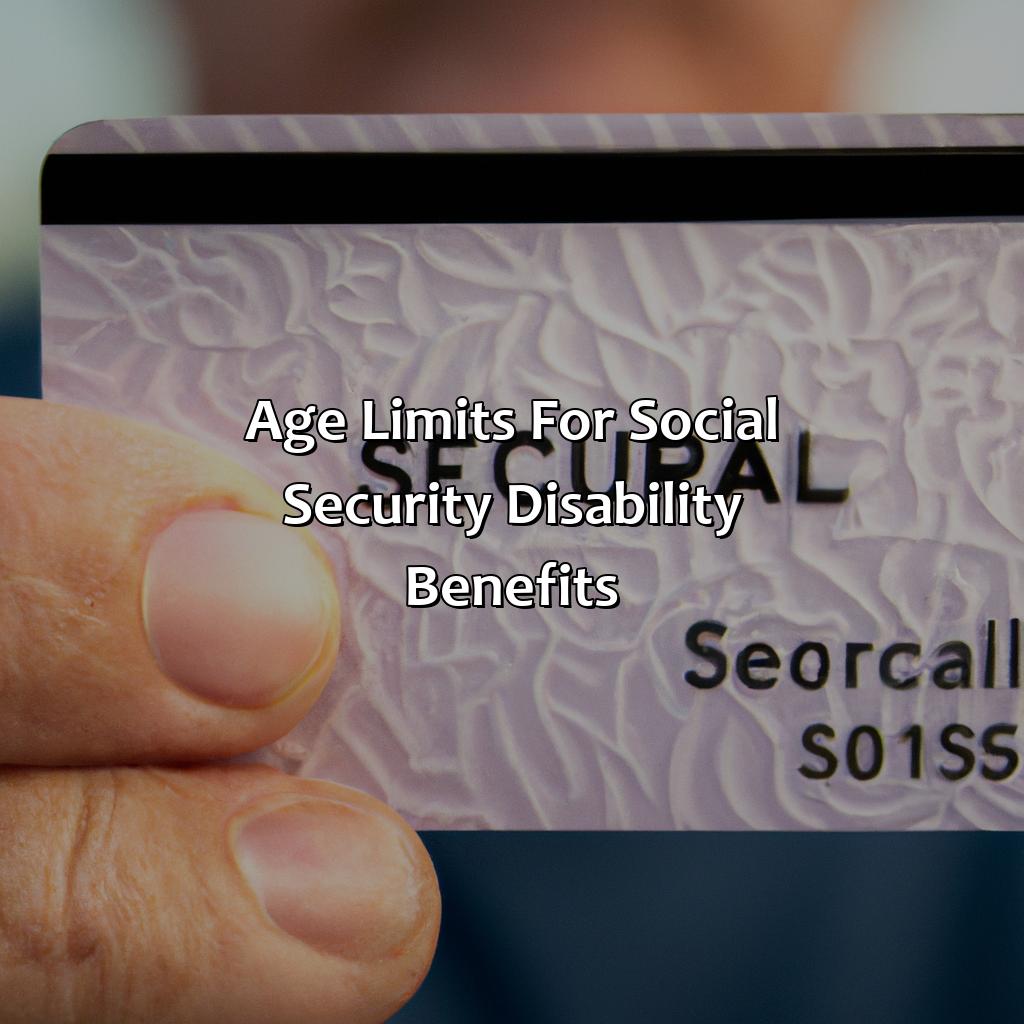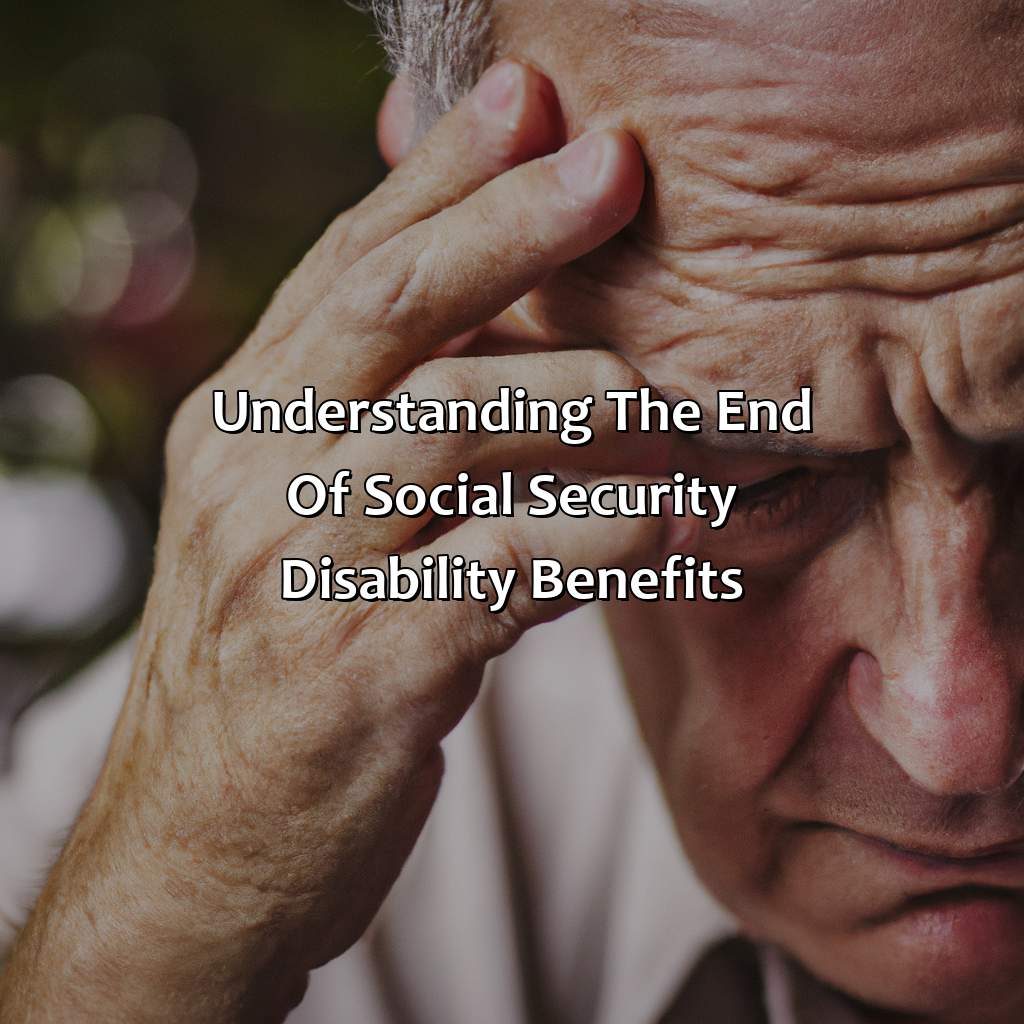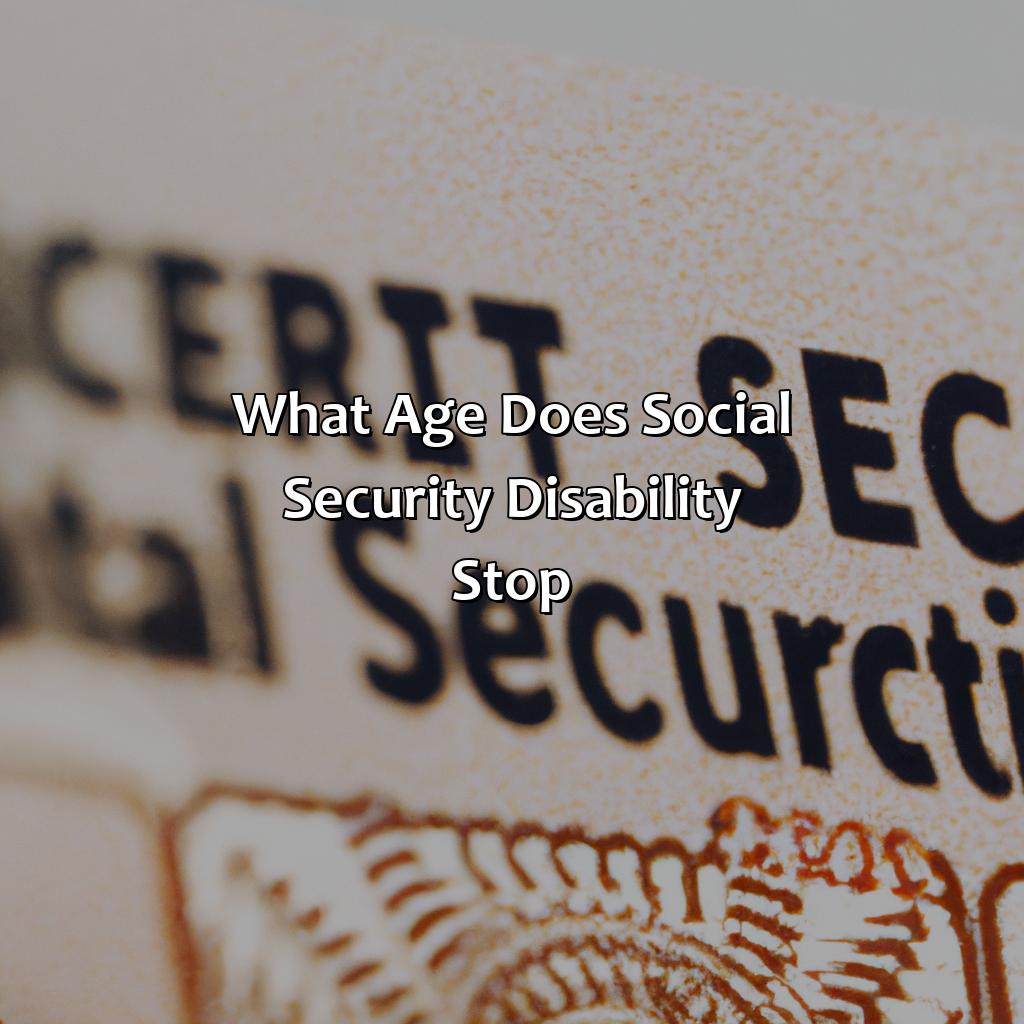What Age Does Social Security Disability Stop?
Key Takeaway:
- Social Security Disability benefits are available for those who are unable to work due to a disability, but eligibility requirements, such as work credits and medical documentation, must be met.
- The age limit for Social Security Disability benefits depends on various factors, such as the disability onset date, full retirement age, and status as a dependent or child with a disability.
- The end of Social Security Disability benefits can occur due to medical improvement, returning to work, reaching retirement age, or other reasons for benefit cessation. It’s important to understand the guidelines and processes for these situations.
Are you wondering when social security disability payments will come to an end? You need to know the criteria and timeline for payments to plan your retirement effectively. This article will provide you with the answers you need.
Social Security Disability Benefits Eligibility
Social Security Disability Benefits Eligibility varies depending on the applicant’s age, work history and medical condition. To be eligible, the applicant must have worked in jobs covered by Social Security and have a medical condition that meets Social Security’s definition of disability. The age factor determines the type of disability benefits, which stops at different ages for different benefits programs.
In terms of Social Security Disability Insurance (SSDI), the program is designed to provide benefits to individuals who have worked long enough and paid Social Security taxes. Generally, SSDI stops at full retirement age (currently at age 66) when the individual is already entitled to full retirement benefits. On the other hand, Supplemental Security Income (SSI) provides benefits to individuals with limited income and resources, regardless of their work history. SSI benefits can continue throughout the individual’s lifetime unless there are significant changes in their income and resources.
It is important to note that the Social Security Administration conducts medical reviews at varying intervals to determine whether the recipient still meets the definition of disability. These reviews are conducted regularly to ensure that only eligible individuals receive benefits.
In a true story, a woman in her early 50s experienced an accident that left her unable to work due to severe physical limitations. She applied for SSDI benefits and was approved due to the severity of her disability. However, as she approached full retirement age, her SSDI benefits stopped, and she was automatically enrolled in the retirement benefits program.

Image credits: retiregenz.com by Yuval Arnold
Age Limits for Social Security Disability Benefits
To figure out the age requirements for Social Security Disability Benefits, take a look at our analysis. This covers Full Retirement Age, Disability Benefits, and Kids/Dependents with Disabilities. Learn about the age limits for SSDI and SSI benefits. Also, find out how eligibility and payments may alter as you grow older.

Image credits: retiregenz.com by Joel Duncun
Full Retirement Age and Disability Benefits
Social Security Disability Benefits cease at a certain age, known as the Full Retirement Age. This varies based on your birth year, with the current age limit being 67 for those born after 1960. After this age, Disability benefits convert to Retirement benefits automatically. The payment amount remains the same; however, there are no medical requirements or limitations thereafter.
Moreover, if you already receive disability benefits before reaching Full Retirement Age, they will automatically convert to retirement benefits on reaching that age without any application process. Your payments will continue seamlessly without further administrative burden.
Interestingly, in the early days of Social Security Disability Benefits program starting in 1958, there was no such defined Full Retirement Age for disabled people. This meant that some people could potentially receive disability benefits indefinitely without being converted to retirement benefits once they reached a certain age!
Why worry about retirement when you can just have a disabled child who will never leave the nest?
Children and Dependents with Disabilities
Individuals who are dependents and suffer from disabilities may qualify for social security disability benefits. The eligibility criteria includes the severity of the disability, age of the dependent and their relationship to the benefactor. In such cases, Social Security Disability Insurance (SSDI) or Supplemental Security Income (SSI) programs can provide financial support to disabled children and dependents.
The dependents must meet certain requirements such as having a medical condition that is expected to last at least 12 months or result in death, and they must be under 18 years old or enrolled as full-time students in elementary or secondary schools. Additionally, adults who became disabled before turning 22 years old can also qualify for Social Security Disability benefits under their parent’s earnings record.
It is important to note that these benefits are not available indefinitely as there may be age limits for Social Security Disability benefits. Once the dependent child turns 18 years old and is no longer enrolled in school on a full-time basis, the benefits may stop unless they have a disability that began before they turned 22 years old.
A true fact – According to the Social Security Administration, around 4 million children with disabilities receive SSI payments totaling approximately $9 billion annually.
Now you finally have an excuse for never growing up: the end of social security disability benefits.
Understanding the End of Social Security Disability Benefits
Awareness of different potential causes is key to understanding when your social security disability benefits may end. You could be attempting to regain eligibility by improving medically or planning to get back to work after recovering. Reaching retirement age or other causes could also result in cessation of benefits. Let’s investigate each of these further.

Image credits: retiregenz.com by Yuval Duncun
Medical Improvement Expected
When beneficiaries attain Social Security Disability Insurance (SSDI), the benefits might stop at some point. One case where the benefits may end is when Medical Improvement Expected is expected. In these scenarios, an individual’s medical condition improves to a degree that makes them able to work and no longer meets SSDI criteria.
Medical Improvement Expected can occur if an individual receives medication or completes a therapy program that significantly improves their condition or gets better as they age. The Social Security Administration (SSA) periodically reviews beneficiaries’ cases in such scenarios, rating which individuals are no longer eligible for their current benefits.
If the SSA determines that a beneficiary’s health has improved satisfactorily enough for them to perform substantial gainful activity, their SSDI benefits may end. However, beneficiaries who find themselves in this position can explore returning to work on a trial basis with the assurance that if they fail, their benefits would be reinstated.
In contrast, those whose benefits cessation occurs unexpectedly can appeal against it. An appeal could lead to a hearing before an administrative law judge who will review their case and make a final decision.
Beneficiaries who experience Medical Improvement Expected conditions should stay informed on how the SSA conducts its reviews and be aware of potential requirements necessary for maintaining disability status or transitioning back into work successfully.
Good news for those returning to work after receiving social security disability benefits- you can finally upgrade from Ramen noodles to spaghetti!
Returning to Work
For individuals receiving Social Security Disability Benefits, going back to work is not always easy. The Social Security Administration offers many programs specifically designed to help individuals return to work and transition off of disability benefits.
One such program is the Ticket-to-Work program which offers training, counseling, and job placement assistance. Additionally, the trial work period allows individuals to test their ability to work without losing their benefits. Once an individual successfully completes the trial work period and earns a certain level of income for nine months, they will no longer be considered disabled and their benefits will stop.
It’s important to note that even after returning to work, individuals may still qualify for healthcare through Medicaid or Medicare. It’s best to speak with a Social Security representative for more information.
Many individuals have successfully returned to work and achieved financial stability thanks to these programs.
Retirement age is when you can finally stop pretending to like your coworkers and start pretending to like gardening.
Reaching Retirement Age
As one approaches the age of retirement, the question arises as to what happens to their Social Security Disability benefits. When a disabled individual reaches full retirement age, their SSDI payments stop automatically and are replaced by regular ones.
It is important to note that although these two benefits have different names, they essentially come from the same source – the Social Security Administration. Therefore, there will be no reduction in overall payment amount when the change occurs.
Additionally, those who receive disability benefits have an advantage over other retirees since they do not have to apply again for regular retirement benefits. Instead, they will receive them automatically once they reach full retirement age.
To avoid a sudden halt in financial support at later stages in life, it is crucial to understand how Social Security Disability and Retirement benefits work hand-in-hand. Plan accordingly and make necessary arrangements before reaching full retirement age.
Other Reasons for Benefit Cessation
Social Security Disability benefits may cease due to a variety of reasons. These include, but are not limited to, medical improvement, medical recovery, or a return to work. When these occur, beneficiaries may be notified that their benefits will end soon.
Moreover, the Social Security Administration requires periodic reviews to determine if the beneficiary still meets the eligibility criteria for their disability status. In such cases where the beneficiary no longer meets the criteria, benefits will be stopped.
It is noteworthy that any changes in income or assets can affect an individual’s eligibility for Social Security Disability benefits as well. It is wise for beneficiaries to report any changes in their circumstances to avoid overpayment or underpayment issues.
Overall, communication and prompt reporting to the Social Security Administration can prevent significant problems relating to cessation of Social Security Disability benefits in the future. By staying informed and adhering to regulations, beneficiaries can continue receiving disability benefits without interruption.
Five Facts About “What Age Does Social Security Disability Stop?”
Social Security disability benefits will continue for as long as you remain disabled and unable to work.
Individuals who receive Social Security disability benefits will undergo a periodic disability review to determine if they are still eligible for benefits. (Source: Social Security Administration)
The age at which Social Security disability benefits stop depends on the recipient’s current age, type of disability benefits received, and work history. (Source: Allsup)
Individuals who receive Social Security disability benefits may also qualify for additional programs such as Medicare and Medicaid. (Source: Medicare.gov)
The process of applying for and receiving Social Security disability benefits can be complex and lengthy, often requiring the assistance of an experienced attorney or representative. (Source: Disability Advocates Group)
FAQs about What Age Does Social Security Disability Stop?
What age does social security disability stop?
Social Security Disability benefits will continue until you reach full retirement age, which is typically 66 or 67. At that point, your disability benefits will convert to retirement benefits.
Can social security disability benefits stop before retirement age?
Yes, Social Security Disability benefits can stop prior to reaching full retirement age if your medical condition improves and you are able to work. Additionally, if you are earning substantial income, Social Security may determine that you are no longer disabled and stop your benefits.
Will I be notified when my disability benefits are going to stop?
Yes, you will receive a notice from Social Security approximately three months before your disability benefits are scheduled to end. The notice will explain why your benefits are stopping and what options you have going forward.
What happens if I reach retirement age and am still disabled?
If you continue to be disabled when you reach full retirement age, your disability benefits will convert to retirement benefits, but the amount of your benefit will not change. You may also be eligible for Supplemental Security Income (SSI) if you have limited income and resources.
Is there a way to extend my disability benefits beyond retirement age?
No, once you reach full retirement age your disability benefits will automatically convert to retirement benefits and cannot be extended beyond that point. However, if you qualify for Supplemental Security Income (SSI), you may be able to receive ongoing benefits.
Can I work while receiving disability benefits?
Yes, you are allowed to work while receiving disability benefits, but there are certain income limits you must not exceed. If you earn too much income, Social Security may determine that you are no longer disabled and stop your benefits.
 Checkout this IRS Loophole
Checkout this IRS Loophole 
